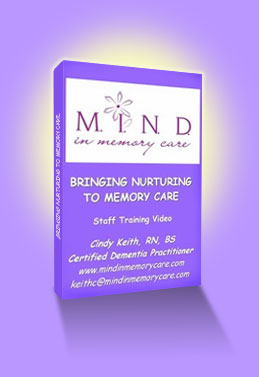 |
|
| Home | Biography | Family Consultations | Facility Training | Testimonials | Links & Resources | Cindy's Blog |
Staff Training Video
An excellent alternative to having Cindy travel to your facility to train your staff, is to purchase her training video. “Bringing Nurturing To Memory Care” consists of two DVD’s that run for 2 hours and 28 minutes and includes a written test, which would make this a valuable three hour staff dementia training. Imagine having this valuable resource at your fingertips to present during in-services to numerous staff members, or each time you hire a new employee.
"Cindy's up to date workshop on managing the behaviors of persons with dementia (PWD) provided useful and realistic interventions for anyone working with this special client population. She covered a number of dementia behaviors such as pacing and wandering, catastrophic reactions, disruptive behaviors and the triggers that often precipitate the behaviors. Most importantly, she provided many real world examples of scenarios which have occurred in her nursing practice in relation to dementia. I have used a number of her suggested responses with great success. I strongly endorse her workshops as well as her educational DVDs."
Darlene Clark, RN, MS, Senior Lecturer in Nursing, Penn State University
 |
The cost of the video is $130 plus $7.00 shipping and handling (in the U.S.) and PA residents must add 6% sales tax ($7.80)*. |

I invite you to scroll through the outline listed below:
Bringing Nurturing to Memory Care
- Dementia Facts
- Over 40 different dementia types and what they have in common
- Most common types: Alzheimer's, Lewy Body, Multi-Infarct
- Different dementia types = different behaviors
- Effects of aging baby boomers on dementia statistics
- Your "Objective" with this population: Maintain or improve the health, happiness dignity & safety of every person with dementia
- Based on the Objective--the needs you must see to in this population
- Why their needs are different--hydration; maintaining weights; activities; safety issues including falls; how to avoid negative outcomes
- Looking at "Resident Rights" in a new light based on this Objective
- How your actions can easily be interpreted as abuse or neglect
- Your actions determine the outcome for every encounter
- YOU ARE responsible if you are injured by a person with dementia, or if a person with dementia is injured by you during care
- Based on the Objective--the needs you must see to in this population
- The "skills" you must have in order to work effectively and safely with this population
- Nurturing, patient, loving
- Good work ethic
- Willingness to learn about your residents
- Resident oriented and not task oriented
- Common, incorrect caregiver responses to people with dementia (scenario)
- Treating them like a child
- Lecturing and re-orienting
- Impatience
- Anger
- Blame
- Communicating with impaired brains
- Your body language speaks louder than your words
- Get in their reality and out of your own
- Validate feelings and emotions
- Redirection vs. commands
- Offering choices
- Finding the "triggers" behind behaviors
- Examples of triggers for certain behaviors
- Triggers can be positive or negative
- Communicating with other team members for problem-solving and support
- Behavior changes in people with dementia
- Know the resident's "normal" behavior
- Sudden deviation from "normal" could indicate an illness or pain
- Depression and dementia
- How to differentiate
- Why it is important to have depression treated
- Specific behaviors, how to manage them, and possible triggers behind them
- Sundowning
- Pacing/fidgeting
- Packing repeatedly
- Shopping" in other people's rooms or closets
- Hoarding/hiding
- Refusals to take medications
- Refusals to bathe
- Disrobing in public
- Suspicious/paranoid behaviors
- Agitation
- Shouting, screaming repetitively
- Sexual inappropriateness
- Repetitive questions
- Exit-seeking
- Combativeness
- Some things you should never do when interacting with people with dementia, and what you can do instead:
- Command or force
- Argue or try to reason with them
- Shame them
- Speak or act in a condescending manner
- Say "I told you..." or "You can't..."
- Talk over them as if they are not present
- Laugh AT them
- Take anything a person with dementia says or does personally
- Some things to always do when interacting with people with dementia:
- Greet pleasantly, smile, touch gently or hug
- Tell family one positive thing about their loved one every time you see them
- Communicate what works well with other team members, and to family
- Step away when you feel frustrated
- Treat the person with dementia with dignity and respect as an elder
- Conclusion

Download the test and answer key here*!
Staff Training Video Test (Word Doc)
Staff Training Video Answer Key (Word Doc)
*For use ONLY with Cindy's “Bringing Nurturing To Memory Care” video.

Alzheimer's and Dementia Counseling and Education
call Cindy Keith of M.I.N.D. in Memory Care
(814)-235-0691
keithc@mindinmemorycare.com
© 2018 Mind in Memory Care. All rights reserved.
| Home | Biography | Family Consultations | Facility Training | Testimonials | Links & Resources | Cindy's Blog |


